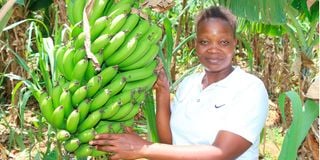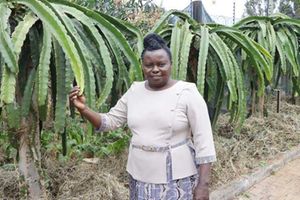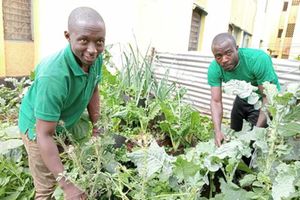
Teresia Kijedi a local farmer and member of Avigwili Banana Processors displays bunch of tissue culture banana.
Vihiga County in Western Kenya is endowed with lush rolling hills. The Seeds of Gold team meets Mary Malojo, four other women and a man in Gavudanyi village, packaging banana crips to take to local markets.
Malojo is the chairperson of Avigwili Banana Processors, an enterprise made up of 36 members. It cultivates and adds value to tissue culture bananas.
Initially, it was a merry-go-round group. On realising that it took many months for members to receive their dues, it shifted to table banking.
The group supplemented its income with growing and selling indigenous bananas, a hustle that made little difference.
In 2023, they started adding value to tissue culture bananas after training. Group members came to learn that the business would have a bigger reach and bring in more money. Malojo says members also wanted to improve their incomes.
Through value-addition, the group was assured of increased shelf-life of its products.
“Our other objective was to reduce post-harvest losses, especially during transport and marketing, which account for 25 to 50 per cent of production for most farmers,” she says.

Avigwili Banana Processors chairperson Mary Malojo (left) and Rhoda Jirangwa, a member, in Gavudunyi Village, Vihiga County with a solar drier used in the value chain of tissue culture bananas.
The Anglican Development Services Western (ADSW) Region trained group members on improving sustainability and resilience through climate-smart farming of tissue culture banana .
ADSW also gave the group a weighing scale, chopping knives, a solar dryer, deep fryer, packaging machine and other kits.
Bukura Agricultural College trained the group members on value-addition.
Malojo says the improved tissue banana varieties are divided into two – for cooking and ripening.
“Due to their flavour and creamy texture, ng’ombe, nusu ng’ombe and Uganda green varieties are for cooking, whereas the Chinese dwarf, Williams and giant Cavendish are for ripening,” she adds.
Malojo says one needs to have clean tissue culture banana suckers from a certified cultivator or farm. The farmer should establish a nursery bed.
Experts insist on proper management and agronomical practices after planting. It takes 10 months from the time of planting for the fruits to begin forming.
“Tissue culture banana harvests are high and the plants are resistant to pests and diseases,” Malojo says, adding that the group also buys the bananas from local markets and growers at Sh500 a bunch.
Once the produce arrives at the value-addition plant, it is weighed and washed thoroughly before being peeled. The bananas are then cut to pieces and washed again.
From here, the bananas are placed in a solar drier for about five minutes. Turmeric is added to the peeled and dried bananas to make them golden yellow. Salt is added for seasoning.
They are then fried, with the crisps being packaged for distribution soon after. A 50g packet of the crisps goes for Sh50 while a 100g pack is double that amount.

Maclead Akhaya, the secretary of Avigwili Banana Processors displays banana crisps.
Buyers, Malojo says, come from Chavakali, Mbale, Serem, Kisumu, Kakamega and other regions.
The profits are ploughed back into the business for other investments like poultry.
Avigwili Banana Processors Group Secretary Maclead Akhaya says value-addition has improved the economic status of local women.
“Selling bananas directly from the farm through middlemen was not profitable,” he says.
The vision of Avigwili Banana Processors is to make other products from raw bananas, including granulated flour, powder and juice.
Lydia Wekesa, the ADSW Project Coordinator, says smallholder farmers in Vihiga faced many challenges in the past.
“Access to inputs was problematic and market linkages were insufficient. Solutions include training on climate smart techniques,” she says.










